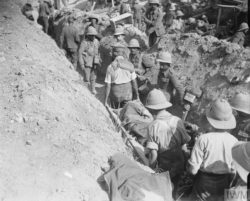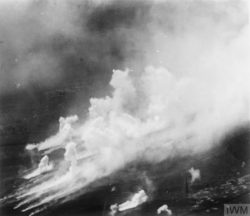Mobility
Oscar Brady was born in Ireland, where he lived and worked as a labourer before enlisting in the army in 1906, at the age of 19.
During his 14 years in the army, Oscar was mobilised all over the world. Before the outbreak of the First World War, he was stationed in the UK, first in Plymouth and then in Bristol. Following this, he served in India for several years. Whilst stationed here, he suffered numerous health problems. For instance, he contracted malaria for which he was hospitalised several times in India between 1908 and 1909. He also later suffered from both gonorrhea and infected eczema. For each of these he was treated at a local hospital in Colaba. Malaria is a tropical disease and therefore unlike anything the soldiers would ever have experienced at home, but the movement of troops due to the war meant there were outbreaks elsewhere including Britain [King, 1998]. Therefore the war exposed people to new illnesses, which had to be considered by the pensions board once they returned from the First World War.

A communication trench during an action in Gallipoli. Copyright: © IWM. Original Source: http://www.iwm.org.uk/collections/item/object/205193292
By the time the war broke out he had returned to Europe, and was stationed initially in Gallipoli. This was a very short and ultimately unsuccessful campaign, when allied forces tried to take control of the sea route from Europe to Russia.
Following this he was transferred to France, where he became ill again, this time suffering from bronchiectasis and pleurisy - both lung conditions that can be caused by inhaling dust and harmful gases, something which soldiers were at a higher risk of being exposed to. The pensions board later deemed these conditions to be due to the effects of the war. He was initially treated in Thiepval, France, before being evacuated to First General Hospital, Aberdeen. He was eventually able to return to the front, and served in Belgium until the end of the war.

Gas attack photographed from the air. Copyright: © IWM. Original Source: http://www.iwm.org.uk/collections/item/object/205288286
Despite the war ending in 1918, Oscar was still plagued by its effects, and was admitted to Catterick Military Hospital in Yorkshire for to his lung conditions. Following his discharge, he returned to his hometown of Limerick. It is likely it would have been difficult for him to return to the place where he grew up, but in a very different condition to when he was there last. This may be particularly true since historians have found that soldiers returning to Ireland faced stigma from their communities because of the strong anti-British sentiment in Ireland at the time. There is evidence that veterans were discriminated against in employment, where foremen would preferentially hire non-veterans, and ex-soldiers experienced unemployment at a higher rate than civilian men [Robinson,2017]. The Ministry of Pensions awarded him a pension for 50% disablement, suggesting that his condition had a significant impact on his life. This is reflected in works such as the poems of Siegfried Sassoon, who wrote about the experience of returning home broken and the way in which people behaved towards them. Society glorified the returning troops, but did not fully understand their experiences and how difficult it was for them to return to civilian life.
Use the map below to follow Oscar's journey around the world
Blue points indicate Oscar's pre-war service, and red points Oscar's movement during the First World War.
